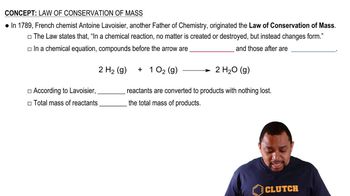A match is lit and held under a cold piece of metal. The following observations are made: (a) The match burns. (b) The metal gets warmer. (c) Water condenses on the metal. (d) Soot (carbon) is deposited on the metal. Which of these occurrences are due to physical changes, and which are due to chemical changes?
Two positively charged particles are first brought close together and then released. Once released, the repulsion between particles causes them to move away from each other. (a) This is an example of potential energy being converted into what form of energy?

Verified Solution
Key Concepts
Potential Energy

Kinetic Energy

Conservation of Energy

A silvery metal is put inside a beaker of water. Bubbles form on the surface of the metal and it dissolves gradually. (a) Is this an example of a chemical or a physical change?
(a) Calculate the kinetic energy, in joules, of a 15-g bullet moving at 120 m/s.
Two positively charged particles are first brought close together and then released. Once released, the repulsion between particles causes them to move away from each other. (b) Does the potential energy of the two particles prior to release increase or decrease as the distance between them is increased.
For each of the following processes, does the potential energy of the object(s) increase or decrease? (b) Water is pumped from ground level to the reservoir of a water tower 30 m above the ground.
What is the kinetic energy and velocity of the aluminum sphere in Problem 1.4 at the moment it hits the ground? (Assume that energy is conserved during the fall and that 100% of the sphere's initial potential energy is converted to kinetic energy by the time impact occurs.)
